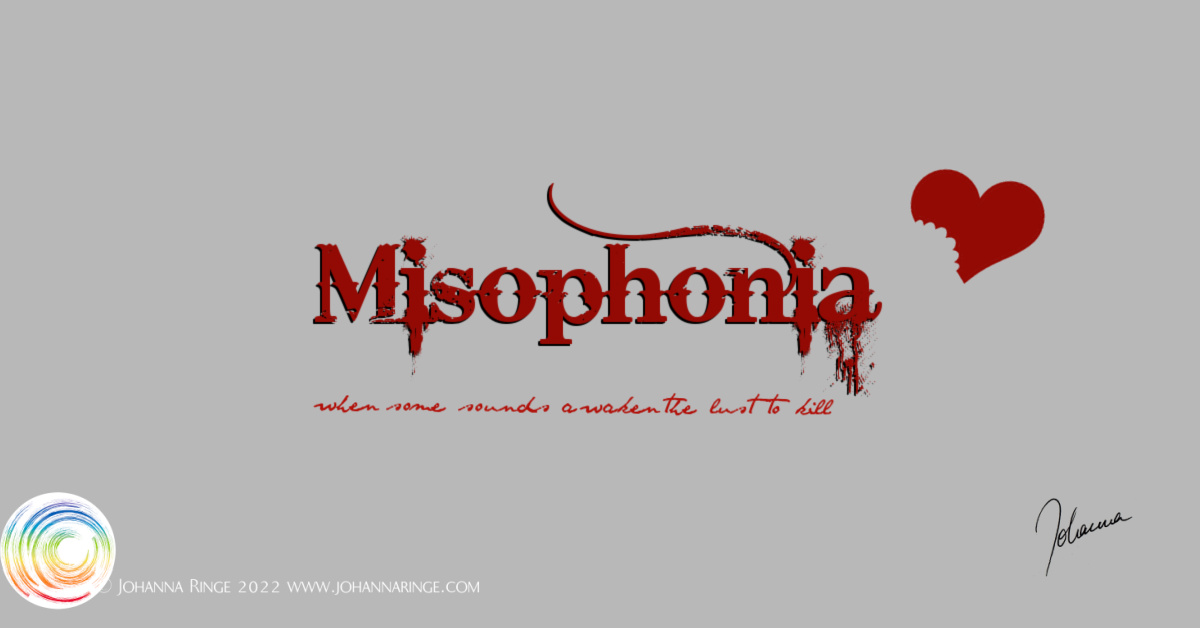Recently, I have come across an issue repeatedly: misophonia. Some people feel extremely disturbed by the chewing sounds of their fellow human beings. Or by all eating noises such as smacking, chewing, swallowing, slurping, and biting off. As soon as they sit at the table with their family and the first spoonful of soup is slurped, or someone noisily drinks a large glass of water, those affected feel a hot rage rise inside them. They cannot escape it and often do not know what is happening to them.
I know this from myself too. Not always, though, and not with every other person. But very often, especially in the morning, my coffee-drinking husband drives me crazy, just by normal eating behaviour. He is a civilised being, please do not get me wrong here. The problem here is clearly mine, not his.
Some sounds awaken my murderous desires.
Sometimes it is the loud swallowing, then the frantic scratching movements with which a yoghurt pot is emptied. With others, it is eating an apple, the way someone stares at it and looks for the next place to bite off. Another simply goes insane when someone chews gum and pops bubbles too.
These are all things that most of us have probably done ourselves, more or less exactly like this. And yet there are people in whom these sounds arouse tremendous aggression when others, especially close ones, make them. There are also other hated sounds, such as children crying, cutlery clattering or whistling. It seems that the problem is above all the repetition of the noise.
Misophonia has many faces.
Brief research revealed that there is even a word for it: misophonia, from the Greek; loosely translating to „hate of sounds“. In the relevant Wikipedia article, they say it is not classified as an auditory or psychological condition. And that pleases me, because I consider this phenomenon to be simply a symptom of the high sensitivity of many people. And I am not just talking about highly sensitive people (HSPs):
Being sometimes more, sometimes less sensitive is normal.
Apart from the about 15-20% of humanity who are said to be highly sensitive, there are also stress-related and illness-related phases of high sensitivity that occur in those affected (regardless of their sensitivity in a healthy state). In other words, if you are under extreme stress, you may temporarily feel unexpected aggression rise in you because your sweetheart is sipping her tea. Or the toddler snuffles. Or the mother in need of care sighs absent-mindedly. Here we have already indirectly listed three exceptional states that go hand in hand with high psychological tension: Wedding preparations, second or third pregnancy and caring for elderly parents.
Highly sensitive persons in exceptional situations are doubly affected.
In addition to their already weaker filtering ability as far as any sensory impressions are concerned, there are also the stress-related sensitivities. This then leads to reactions that might be called „hysterical“ or „crazy“ by uninitiated outsiders. But they are absolutely normal, appropriate to the circumstances. If the highly sensitive person deals openly with their sensitivity, they give their partner and family the chance to be prepared.
- If your child’s apple-biting bothers you, cut their apple into smaller pieces.
- If your loved one chewing her soup infuriates you, take it with humour, and tell them so.
- If your elder sighs non-stop, sigh deeply too… it eventually relaxes your body. (And take a little break on the balcony as soon as possible. Take care of your well-being too! On dealing with boundaries, closeness, and high sensitivity, see also here).
- If your sweetie absolutely must chew gum while driving, reach for your headphones and choose your own soundscape.
There are numerous possibilities for a mindful treatment of this issue. And there are also the situations in which you no longer have the strength for this and start to yell, or must leave the room in a rage so as not to do anything rash, because
The ears never sleep.
Please, don’t blame yourself if it happens, but remember that all people are fallible. (Not only those who make the noises.) So are you. So am I. And learning to deal with your own high sensitivity also means forgiving yourself for it, and sometimes seeking salvation in escape.
But we humans are also capable of learning. The next time you could try a humorous approach: „If you pop one more gum bubble, child, I’ll put myself in a safe and lock it from the inside!“ The irritated expression that follows is worth it, and at least they cannot pop bubble gum when they are open-mouthed staring at their mother who has just uttered some inconceivable nonsense!
Sincerely (and very quietly!), wherever you are,
 P.D.: Misophonia is to be differentiated from hyperacusis (hypersensitivity to certain frequencies and volume ranges) and phonophobia (fear of sounds).
P.D.: Misophonia is to be differentiated from hyperacusis (hypersensitivity to certain frequencies and volume ranges) and phonophobia (fear of sounds).


Recently, I have come across an issue repeatedly: misophonia. Some people feel extremely disturbed by the chewing sounds of their fellow human beings. Or by all eating noises such as smacking, chewing, swallowing, slurping, and biting off. As soon as they sit at the table with their family and the first spoonful of soup is slurped, or someone noisily drinks a large glass of water, those affected feel a hot rage rise inside them. They cannot escape it and often do not know what is happening to them.
I know this from myself too. Not always, though, and not with every other person. But very often, especially in the morning, my coffee-drinking husband drives me crazy, just by normal eating behaviour. He is a civilised being, please do not get me wrong here. The problem here is clearly mine, not his.
Some sounds awaken my murderous desires.
Sometimes it is the loud swallowing, then the frantic scratching movements with which a yoghurt pot is emptied. With others, it is eating an apple, the way someone stares at it and looks for the next place to bite off. Another simply goes insane when someone chews gum and pops bubbles too.
These are all things that most of us have probably done ourselves, more or less exactly like this. And yet there are people in whom these sounds arouse tremendous aggression when others, especially close ones, make them. There are also other hated sounds, such as children crying, cutlery clattering or whistling. It seems that the problem is above all the repetition of the noise.
Misophonia has many faces.
Brief research revealed that there is even a word for it: misophonia, from the Greek; loosely translating to „hate of sounds“. In the relevant Wikipedia article, they say it is not classified as an auditory or psychological condition. And that pleases me, because I consider this phenomenon to be simply a symptom of the high sensitivity of many people. And I am not just talking about highly sensitive people (HSPs):
Being sometimes more, sometimes less sensitive is normal.
Apart from the about 15-20% of humanity who are said to be highly sensitive, there are also stress-related and illness-related phases of high sensitivity that occur in those affected (regardless of their sensitivity in a healthy state). In other words, if you are under extreme stress, you may temporarily feel unexpected aggression rise in you because your sweetheart is sipping her tea. Or the toddler snuffles. Or the mother in need of care sighs absent-mindedly. Here we have already indirectly listed three exceptional states that go hand in hand with high psychological tension: Wedding preparations, second or third pregnancy and caring for elderly parents.
Highly sensitive persons in exceptional situations are doubly affected.
In addition to their already weaker filtering ability as far as any sensory impressions are concerned, there are also the stress-related sensitivities. This then leads to reactions that might be called „hysterical“ or „crazy“ by uninitiated outsiders. But they are absolutely normal, appropriate to the circumstances. If the highly sensitive person deals openly with their sensitivity, they give their partner and family the chance to be prepared.
There are numerous possibilities for a mindful treatment of this issue. And there are also the situations in which you no longer have the strength for this and start to yell, or must leave the room in a rage so as not to do anything rash, because
The ears never sleep.
Please, don’t blame yourself if it happens, but remember that all people are fallible. (Not only those who make the noises.) So are you. So am I. And learning to deal with your own high sensitivity also means forgiving yourself for it, and sometimes seeking salvation in escape.
But we humans are also capable of learning. The next time you could try a humorous approach: „If you pop one more gum bubble, child, I’ll put myself in a safe and lock it from the inside!“ The irritated expression that follows is worth it, and at least they cannot pop bubble gum when they are open-mouthed staring at their mother who has just uttered some inconceivable nonsense!
Sincerely (and very quietly!), wherever you are,